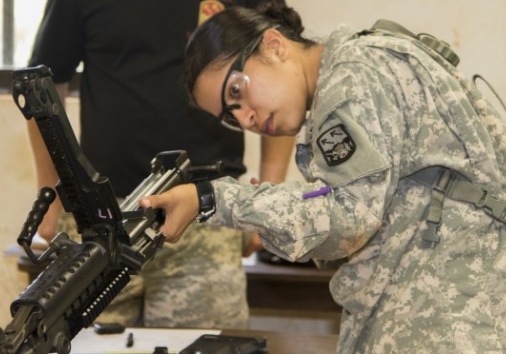An Army Air Defense Enhanced Early Warning System Operator, or MOS 14H, communicates invaluable information about incoming enemy attacks.
These individuals work with air defense equipment and systems to ensure the protection of individuals from any attacks.
Communication and situational awareness are two key components of being successful in this position.
Qualifications, Training and Duty Stations
To be recruited into this entry-level position, recruits will take the ASVAB test, among other physical and medical testing requirements.
A score of 98 on General Technical and 99 on Mechanical Maintenance is required.
Like all Army MOS positions, it requires 10 weeks of Basic Combat Training.
After Basic Combat Training, 11 weeks and 3 days of Advanced Individual Training at Fort Sill in Oklahoma is required.
Skills that are helpful in this position include having the ability to multi-task, remain calm in stressful situations, adapt to changing work environments, and the ability to work as a team member.
It is helpful if individuals are interested in working in positions with technical electronic, mechanical and computer systems that require accuracy, attention to detail and critical thinking.
Related Article: Army Height And Weight Standards
Duty Stations
Those serving in the Army as an MOS 14H can expect to be potentially based at one of the following duty stations:
Inside the Continental US (CONUS)
- Ft. Bliss, TX
- Ft. Bragg, NC
- Ft. Hood, TX
- Ft. Peterson, CO
- Ft. Sill, OK
- Ft. White Sands, NM
Outside the Continental US (OCONUS)
- Smith, Germany
- Stuttgart Germany
- Carroll, South Korea
- Osan, South Korea
- Suwon, South Korea
- Kadena, Japan
- Misawa, Japan
What are the Job Duties of an Air Defense Enhanced Early Warning System Operator?
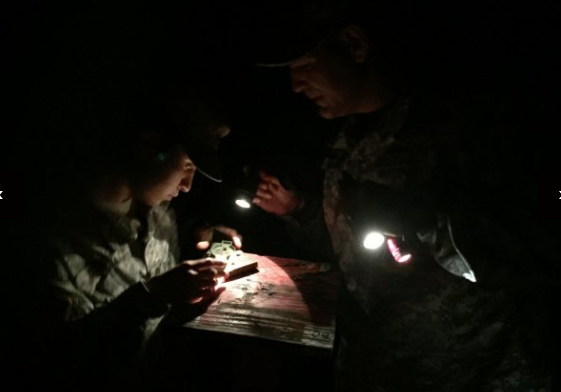
An MOS 14H utilizes advanced communications equipment and complex military computers to evaluate and communicate incoming data related to enemy aerial and missile attacks.
They are responsible for preparing and deploying air defense equipment and any related systems.
They are sometimes responsible for setting up a unit command post.
This includes establishing radio and wire communications, system placement, and initialization.
Soldiers are required to establish and maintain connections with Allied, Joint, and other Air Defense units.
Any possible threats from earth to space are identified, tracked, detected, engaged, and neutralized by these individuals.
They do this by maintaining computer data links and networks for early detection, which allows for situational awareness and air threat data.
MOS 14H individuals will collect, integrate and process any tactical battlefield information they receive from multiple locations and sensors.
They provide real-time status reporting during combat and prepare reports to present to higher command.
Related Article – Navy Operations Specialist (OS): Career Details
The MOS 14H soldiers will establish maintenance schedules and reports.
Completing basic maintenance activities on Test Measurement and Diagnostic Equipment and other equipment is also one of their duties.
They also perform preventative maintenance and operational readiness conditioning services.
Sometimes, the individuals are part of Air Defense Command.
They can be in a Patriot air defense unit, Terminal High-Altitude Area Defense batteries, Space and Missile Defense Command, or as a member of air defense activity with operation or intelligence function of liaison unit.
Individuals who are assigned to Space and Missile Defense Command will have assignments with Joint Tactical Ground Station, Forward Based X Radar, and Ground-Base Midcourse Defense.
Possible locations as a MOS 14H soldier include Texas, Oklahoma, North Carolina, Colorado, Hawaii, Republic of Korea, Germany and Japan.
You can find more information about the position duties in the Air Force video below.
What does an Army Air Defense Enhanced Early Warning System Operator get Paid?
This is an entry-level Army position that will start soldiers around $20,000 a year.
Although this may not seem like a high amount, you have to account for additional pay opportunities and benefits.
You can reference the pay table below for Army ranks and pay.
| Insignia | Pay Grade | Rank | Abbreviation | Minimum Monthly Pay |
|---|---|---|---|---|
| E-1 +4 months | Private | PVT | $1,917.60 | |
| E-2 | Private Second Class | PV2 | $2,149.20 | |
| E-3 | Private First Class | PFC | $2,259.90 | |
| E-4 | Specialist | SPC | $2,503.50 | |
| E-4 | Corporal | CPL | $2,503.50 | |
| E-5 | Sergeant | SGT | $2,730.30 | |
| E-6 | Staff Sergeant | SSG | $2,980.50 | |
| E-7 | Sergeant First Class | SFC | $3,445.80 | |
| E-8 | Master Sergeant | MSG | $4,957.20 | |
| E-8 | First Sergeant | 1SG | $4,957.20 | |
| E-9 | Sergeant Major | SGM | $6,055.50 | |
| E-9 | Command Sergeant Major | CSM | $6,055.50 | |
| E-9 | Sergeant Major of the Army | SMA | $6,055.50 |
Benefits
The Army provides benefits that are available in addition to the pay above.
The benefits are generous in comparison to civilian positions.
Army benefits include:
- Insurance: Free/Low-cost medical and dental; paid sick time; low-cost life insurance
- Housing and Food: Provided at the Army post for free (allowances available off-post)
- Clothing: Allowance available for replacement clothing or civilian clothing if required for work
- Vacation: 30 days paid annually
- Education: Tuition assistance opportunities
Opportunities for special situation allowances include cost of living, moving and family separation allowances.
Related Article – Air Force Air Traffic Controller (1C1X1): Career Profile
Job Reviews
Army Air Defense Enhanced Early Warning System Operator positions require individuals to have communication and multi-task.
Most job reviews of the position indicate that the position is what you make of it.
The people who have previously held this position commend on the great health benefits, consistent pay and teamwork.
Negative reviews include the long hours and time away from family.
A few job reviews can be found below:
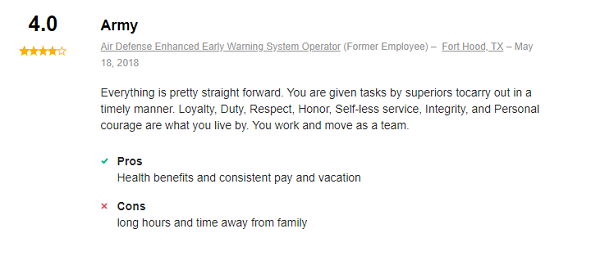
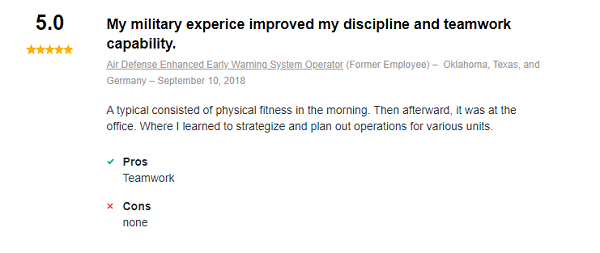
Civilian Career Opportunities
This is a technical position that opens doors in areas such as Information Technology and Networking.
The majority of the duties will match with positions such as Air Traffic Controller and Network and Computer System Administrator.
Other possible related jobs include:
- Emergency Management
- Information Systems Management
- Electrical Repair
- Intelligence Analyst
Some of these positions are more readily available than others depending on the location.
The pay for these positions also varies depending on location and more exact job title.
Working in fields such as Information Technology opens a large network of opportunities and can vary on exact job duties.
Related Article – Navy Intelligence Specialist (IS): Career Details
Summary
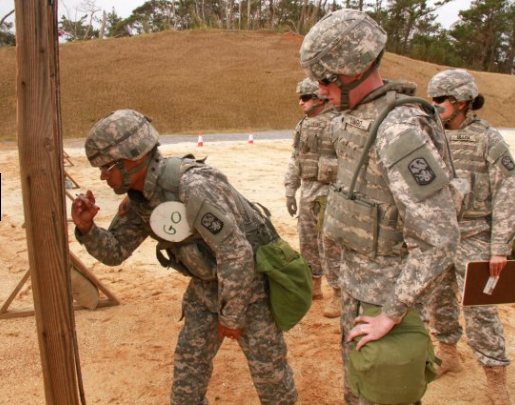
An Army Air Defense Enhanced Early Warning System Operator, MOS 14H, use advanced equipment to communicate data regarding possible incoming threats.
This is a position that requires soldiers to be alert, quick thinking and attentive.
MOS 14H is an entry-level position that will require ASVAB testing for entry.
The position will follow the basic Army pay table and offer benefits.
Individuals who have previously held this position find the work to be fast-paced and generally tend toward recommending it.
Civilian career opportunities related to MOS 14H include Information Technology positions.
References
- Ikon Pass Military Discount: Learn How To Save Big - January 31, 2025
- RTIC Military Discount: Find Out How To Save Big on Gear - January 30, 2025
- Traeger Military Discount: Learn How To Save Big on Smokers - January 28, 2025
General FAQ
What is an MOS 14H in the army?
An Air Defense Enhanced Early Warning System Operator (MOS 14H) monitors and delivers information about incoming enemy attacks with the use of air defense equipment.
What ASVAB score do I need to be an Army Air Defense Enhanced Early Warning System Operator?
What ASVAB score do I need to be an Army Air Defense Enhanced Early Warning System Operator? To become an Air Defense Enhanced Early Warning System Operator (MOS 14H), you’ll need a minimum score of 98 on General Technical and 99 on Mechanical Maintenance when you take the ASVAB.
Where do Air Defense Enhanced Early Warning System Operator (MOS 14H) get stationed?
Some locations an Air Defense Enhanced Early Warning System Operator (MOS 14H) may be stationed in the U.S. are Hawaii, North Carolina, Colorado, Texas, Oklahoma. Overseas, they may go to the Republic of Korea, Germany, or Japan.
How long is training to become an Army Air Defense Enhanced Early Warning System Operator?
An Army Fire Control Specialist has 11 to 12 weeks of Advanced Individual Training (AIT) at at Fort Sill, Oklahoma, after graduation from Basic.
What jobs can an Army 14H get in the civilian world?
Many of the skills of a 14H can translate to networking and computer systems, information systems management, and electrical and electronics repair jobs.

